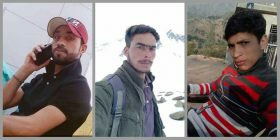New York
The New York based rights watchdog, Human Rights Watch, has said that the Indian authorities should immediately order an independent, impartial investigation into the extrajudicial killing of three labourers by Indian forces in Indian illegally occupied Jammu and Kashmir, last month.
The labourers, Abrar Gujjar, Imtiyaz Gujjar and Abrar Khan from Rajouri district were killed by Indian Army’s 62 Rashtriya Rifles during a CASO at Keller Amshipora in Shopian district on July 18.
The HRW in a statement posted on its website said, the Indian Army claims that the three were militants and were killed in a retaliatory gunfight after they fired on the forces during a search operation on July 18 in Shopian district, and were then buried in Baramulla district. However, it said that the families of the victims in Jammu, who identified them from photographs of the killings circulated on social media, said they were laborers who had gone in search of work.
Meenakshi Ganguly, South Asia director at Human Rights Watch, said Indian forces have long operated with impunity in Kashmir, and past army investigations have been more focused on shielding those responsible for abuse than providing justice. She said that there can be no end to the cycle of violence in Kashmir if forces are not held accountable for their past and current abuses.
The HRW statement said that the families of those killed identified them and said they last had contact with them on July 17, after they reached Shopian to look for work. “The families assumed they may have been quarantined when they could not get in touch after that. They identified their relatives from the photos uploaded on social media of those killed in the Shopian armed encounter and have since filed a missing person report at the police station. The police have said they are also investigating the killings,” it added.
Any army investigation into the recent killings will be meaningless, Human Rights Watch said, because the Armed Forces Special Powers Act (AFSPA) gives the Indian forces effective immunity from prosecution for serious human rights abuses. It grants the military wide powers to arrest, shoot to kill, and occupy or destroy property in cordon operations, it added.
“Since the law came into force in Jammu and Kashmir in 1990, the Indian government has not granted permission to prosecute any security force personnel in civilian courts. Human Rights Watch and others have long documented how the law has become a tool of state abuse, oppression, and discrimination, and called for its repeal. Affected residents, activists, government-appointed committees, politicians, and United Nations human rights bodies have criticized the law,” the statement said.
The HRW said that there had been numerous allegations of extrajudicial killings in IIOJK. Most of those summarily executed are falsely reported to have died during armed clashes between the army and militants in what are euphemistically called “encounter killings”, it added.
“A well-known example is the murder of five men in Pathribal who were identified by the police and army as the militants responsible for the massacre of 36 Sikhs in Chattisinghpora in Kashmir in 2000 and then killed in a supposed armed encounter. Forensic tests ordered by the state government later showed them to be local villagers who were innocent of the Sikh massacre. However, in January 2014, the army said it was closing the case for lack of evidence against the accused army officers,” it pointed out.
The statement said, in a rare case of justice, in November 2014, the army reported that a military court sentenced five soldiers, including two officers, to life in prison for faking an armed encounter and executing three innocent villagers in Machil in 2010. But in July 2017, a military tribunal suspended the punishment of all five soldiers, once again highlighting the culture of impunity, it added.
The HRW said, the latest allegations of extrajudicial killings also come amid the Indian government’s ongoing crackdown in IIOJK since it revoked special status of Kashmir in August 2019 and split it into two federally governed territories. “Hundreds of people remain detained without charge, critics are threatened with arrest, and access to the internet is limited.
There also have been several allegations of new arrests, torture, and ill-treatment by security forces,” it said, adding, the Indian government has also used harsh counterterrorism and sedition laws to clamp down on peaceful critics.
The Indian authorities have failed the Kashmiri people and have long denied them justice for decades of abuses by armed forces, leading to a cycle of unending violence, Ganguly said. “The government should repeal AFSPA, ensure a civilian and independent investigation into the latest killings, and reverse its ongoing restrains on basic rights,” she added.—KMS










